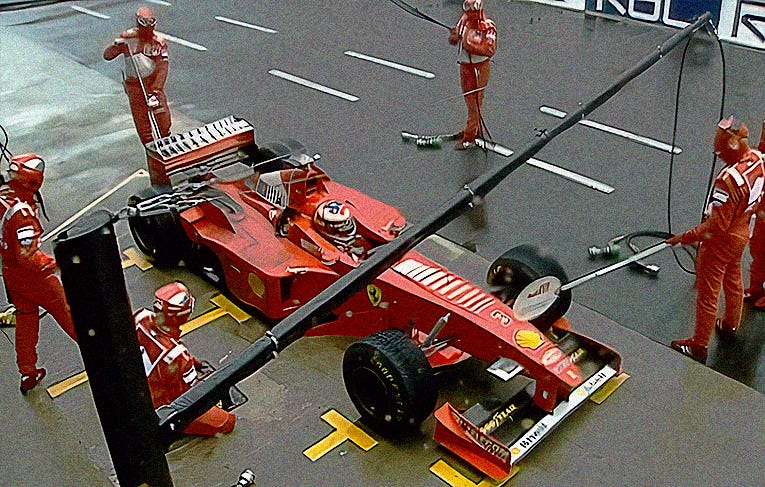The Comedy of Fools: Schumacher Serves a Penalty After Winning the British Grand Prix
The German and Ferrari did nothing wrong. The incompetence of the officials is to blame for the whole mess and confusion.
Michael Schumacher famously won the 1998 British Grand Prix by crossing the finish line in the pits. The German had boxed to serve a 10-second stop-and-go penalty. To date, this remains the only instance in which a race has been won from the pits.
The decision to box Schumacher on the final lap has been widely regarded as an example of Ross Brawn's tactical genius as the Technical Director at Ferrari, showcasing his outside-the-box thinking and brilliant exploitation of a loophole. Well, the latter is much more complicated.
The complication, or rather the confusion, was nicely explained by Jolyon Palmer, Bernie Collins, and Ruth Boscombe in their analysis of the final laps of the race. Here, I would like to focus on a point that was only briefly mentioned by them: the time limit.
Although, before I delve into that, let’s organize the confusion in chronological order, as presented by the International Court of Appeal and the previously mentioned analysis.
The Comedy of Fools Unfolds
On lap 43, during heavy rain, Schumacher laps Alexander Wurz under a yellow flag. The German said after the race that he hadn’t seen the flag due to the poor visibility.
A marshal stationed near the Luffield corner, where the offence happened, writes a note about it on a piece of paper. He does not specify the lap, nor does he sign it.
After 2 minutes, at 15:17, Race Control receives the note; however, Race Director Charlie Whiting learns about it approximately 8 to 13 minutes later.
Whiting informs the stewards but advises them not to take action until the end of the race and to review the video evidence first. At that time, neither the Race Director nor the stewards had seen the incident.
The stewards impose a 10-second penalty on Schumacher on lap 54 at 15:39. They neglect to request Whiting to inform Ferrari through the timing screens, as required by the rules.
Four laps later, at 15:46, the Italian team receives the penalty in writing. A 10-second penalty means that 10 seconds will be added to the Ferrari driver's race time. This is because the stewards assume the offense occurred during the last twelve laps of the race. They're wrong. The incident actually had taken place on lap 43 out of 60, but they are unaware of this because, once again, the marshal's note didn't specify the lap.
As shown in the Palmer-Collins-Buscombe analysis, Jean Todt, the Ferrari Team Principal, asks the official who delivered the penalty whether 10 seconds will be added to Schumacher’s race time or if he must stop. “I don’t know,” is the response.
Ferrari assume the worst: a 10-second stop-and-go. This penalty must be served within three laps of the notification.
The Italian team calls their driver into the pits on lap 60—the final lap of the race. (I haven’t seen a first-hand source confirming who exactly made the decision.) Schumacher crosses the finish line while in the pits, which is legal because it “is a single line which crosses both the track and the pit lane,” as stated in Article 14 of the Sporting Regulations. The German wins the race, finishing 22 seconds ahead of McLaren’s Mika Hakkinen.
McLaren protests the final results of the British Grand Prix, but the stewards dismiss it. After learning all the details of the Schumacher-Wurz incident, they cancel the penalty because Ferrari weren’t notified within the 25-minute time limit mandated by Article 57 of the Sporting Regulations. They were informed 31 minutes after the incident occurred.
McLaren appeals. The ICA upholds the decision of the stewards to cancel the penalty, and consequently, the results of the British Grand Prix.
Time is of the Essence
The reasoning of the Court basically came down to the time limit. I already quoted the relevant part in my post about the black flag incident at the 1994 British Grand Prix, but here it is again:
WHEREAS first of all it must be borne in mind that the crux of the matter was the time at which the Stewards' decision was notified, and that at 15:46 more than 25 minutes had passed since the incident and, therefore, in accordance with Article 57 of the Sporting Regulations, the penalty was unenforceable.
In other words, the sanction was invalid and should not have been imposed. This was one of many mistakes made on July 12, 1998. Let’s again have a laugh and list them:
The marshal did not specify the lap.
The stewards imposed an incorrect penalty.
They forgot to ask Whiting to notify Ferrari through the timing screens.
The penalty was null and void.
The man who delivered the penalty didn't knew whether it was a 10-second penalty or a 10-second stop-and-go.
On the surface, Ferrari's decision to serve an incorrect penalty could be added to the list. In reality, serving a 10-second stop-and-go penalty addressed both options, demonstrating the team's operational excellence.
Credit where credit is due: the stewards acknowledged their mistake. Furthermore, a few days after the ICA's ruling, they accepted responsibility and voluntarily surrendered their licenses.
All of that could have been avoided if the marshal had specified the lap, or better yet, if the stewards had listened to Whiting.
Hurry Slowly
As a side note, it is worth mentioning that the time limit rule still exists, albeit in a different form. The word "incident" has been replaced with "decision."
16.3 Any decision or communication concerning a particular Competitor should be given to him within twenty-five (25) minutes of such decision, and receipt must be acknowledged.
In other words, today, stewards' investigations are not limited by time; the officials are only constrained by the communication of their verdicts.




